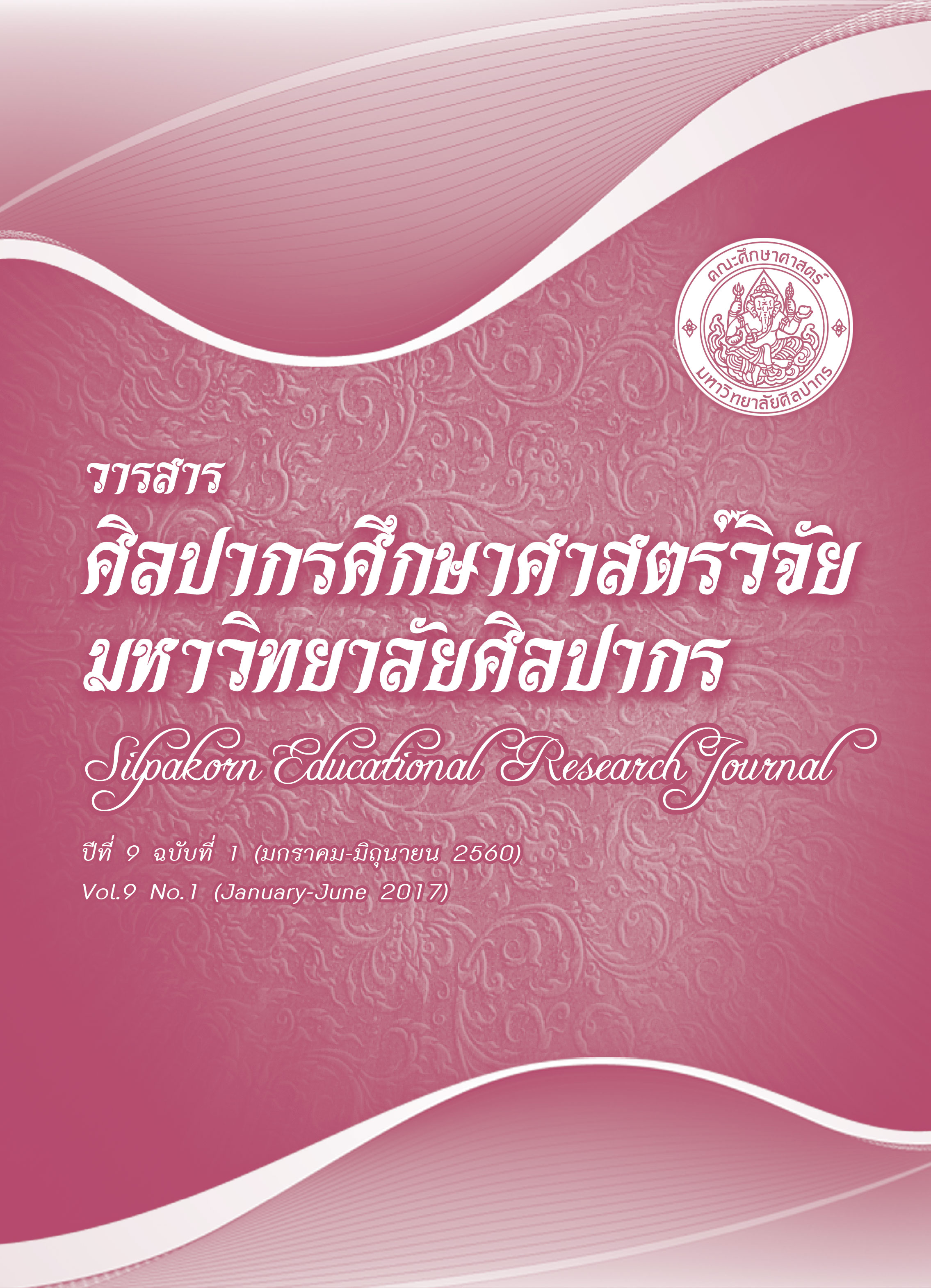การพัฒนารูปแบบการจัดการเรียนรู้แบบดุสิตเพื่อพัฒนาความฉลาดทางอารมณ์ สำหรับนักศึกษาสาขาวิชาการศึกษาปฐมวัย (The Development of DUSIT Learning Model to Enhance Emotional Intelligence for Early Childhood Education Students)
คำสำคัญ:
รูปแบบการจัดการเรียนรู้แบบดุสิต, ความฉลาดทางอารมณ์, นักศึกษาสาขาวิชาการศึกษาปฐมวัยบทคัดย่อ
การพัฒนารูปแบบการจัดการเรียนรู้แบบดุสิตเพื่อพัฒนาความฉลาดทางอารมณ์ สำหรับนักศึกษาสาขาวิชาการศึกษาปฐมวัย
บทคัดย่อ
การวิจัยครั้งนี้มีวัตถุประสงค์เพื่อพัฒนารูปแบบการเรียนรู้แบบดุสิตเพื่อพัฒนาความฉลาดทางอารมณ์ ศึกษาความฉลาดทางอารมณ์ก่อนและหลังการจัดการเรียนรู้แบบดุสิตและศึกษาความพึงพอใจของนักศึกษาที่มีต่อการจัดการเรียนรู้แบบดุสิต กลุ่มตัวอย่าง ได้แก่ นักศึกษาสาขาวิชาการศึกษาปฐมวัย คณะครุศาสตร์ มหาวิทยาลัยสวนดุสิต จำนวน 43 คน ได้มาโดยการเลือกตัวอย่างแบบการสุ่มแบบง่าย กำหนดรูปแบบการทดลองแบบหนึ่งกลุ่มทดสอบก่อนและหลังการทดลอง(One Group Pretest – Posttest Design) เครื่องมือที่ใช้ในการวิจัย ประกอบด้วย รูปแบบการจัดการเรียนรู้แบบดุสิต แบบทดสอบความฉลาดทางอารมณ์ แบบสอบถามความพึงพอใจ วิเคราะห์ข้อมูลโดยค่าร้อยละ ค่าเฉลี่ย ค่าเบี่ยงเบนมาตรฐาน การทดสอบค่าที และการวิเคราะห์เนื้อหา
ผลการวิจัยสรุปว่ารูปแบบการจัดการเรียนรู้แบบดุสิต ประกอบด้วย 4 ขั้น ดังนี้ ขั้นที่ 1 ขั้นนำ ขั้นที่ 2 ขั้นชี้แจงจุดประสงค์การเรียน ขั้นที่ 3 ขั้นสอน ประกอบด้วย 3.1 การอภิปรายและการทำนาย/พยากรณ์ (Discussion and Divination) 3.2 การศึกษาสร้างเสริมความรู้ (Upbringing) 3.3 การสังเคราะห์และนำเสนอผลงาน (Synthetic and Presentation) 3.4 การปรับปรุงผลงาน(Improvement) 3.5 การทดสอบ การประเมินผลการเรียนรู้และการสะท้อนกลับ (Test, Assessment and Reflection) ขั้นที่ 4. ขั้นสรุปและประเมินผล การทดลองใช้รูปแบบการจัดการเรียนรู้แบบดุสิต พบว่า นักศึกษาสาขาวิชาการศึกษาปฐมวัยมีความฉลาดทางอารมณ์สูงขึ้นอย่างมีนัยสำคัญทางสถิติที่ระดับ .05 และมีความพึงพอใจต่อรูปแบบการสอนที่พัฒนาขึ้นโดยภาพรวมในระดับมากที่สุด
The Development of DUSIT Learning Model to Enhance Emotional Intelligence
for Early Childhood Education Students
Abstract
The purposes of this research were to develop the DUSIT Learning Model to Enhance Emotional Intelligence, study emotional intelligence both pre-learning and post learning of Early Childhood Education Students and study the satisfaction of Early Childhood Education Students towards DUSIT Learning Model to Enhance Emotional Intelligence. The participants were 43 Early Childhood Education Students of Suan Dusit University.They were randomly selected by simple random sampling technique. One Group Pretest – Posttest Design was the research design of this study. Research Instruments were 1. DUSIT Learning Model 2. Emotional intelligence test form 3. Questionnaires. Percentage, Mean, Standard Deviation, T-Test, and Content Analysis technique were used to analyse data.
The research results were 1). DUSIT Learning Model consisted of 4 steps (1) introduction (2) learning objective (3) teaching composed of 3.1 Discussion and Divination 3.2 Upbringing 3.3 Synthetic and Presentation 3.4 Improvement and 3.5 Test, Assessment and Reflection. (4) conclusion and assessment. 2) The result of emotional intelligence from DUSIT Learning Model was found that the student post learning’s Mean were significantly higher than their pre-learning counterparts at .05 level. 3) Overall satisfaction of Early Childhood Education Students towards DUSIT learning model to enhance were in high level.





